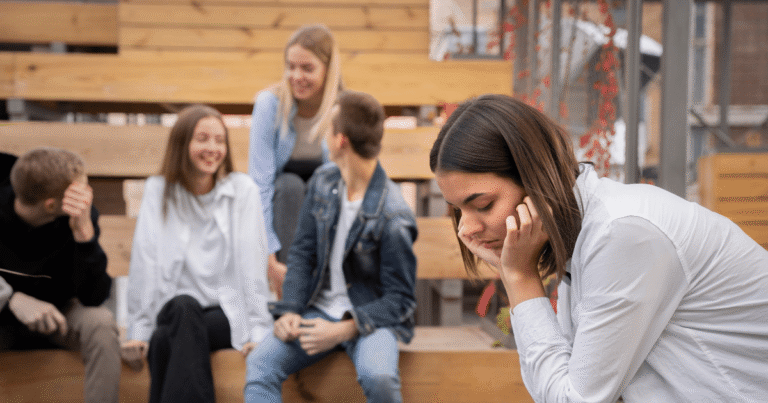Nootropics and Social Anxiety: What the Science Actually Says (And Why Caution Is Essential)
Searching for the “best nootropics for social anxiety”? While natural supplements can be appealing, the reality is more complex than marketing claims suggest.
If you’re considering nootropics for social anxiety, you’re likely hoping for a natural solution that can provide relief without the side effects of prescription medications. While some supplements show promise for general stress and cognitive function, the evidence for treating social anxiety specifically is limited—and there are important safety considerations you need to know.
This evidence-based guide examines what research actually shows about nootropics and anxiety, emphasizes crucial safety information, and explains why professional treatment remains the gold standard for social anxiety disorder.
The Reality Check: What “Best Nootropics for Social Anxiety” Claims Don’t Tell You
The Marketing vs. The Science
What supplement companies often claim:
- Natural alternatives to prescription anxiety medications
- Quick relief from social anxiety symptoms
- Safe because they’re “natural”
- Backed by extensive research
What the research actually shows:
- Limited studies specifically on social anxiety disorder
- Most research involves general stress or mild anxiety, not clinical social anxiety
- Natural doesn’t automatically mean safe or effective
- Quality and dosing of supplements varies dramatically
Why Social Anxiety Requires Special Consideration
Social anxiety disorder is a serious condition that:
- Affects 7-13% of the population at some point in their lives
- Can significantly impair work, relationships, and quality of life
- Has specific neurobiological patterns that require targeted treatment
- Often co-occurs with depression and other anxiety disorders
- Responds best to evidence-based treatments like CBT and specific medications
The supplement limitation: Most supplements studied for “anxiety” involve general stress or test anxiety in healthy individuals—very different from the persistent, debilitating fear that characterizes social anxiety disorder.
The Science Behind Popular Supplements
L-Theanine: The Most Researched Option
What the research shows:
- Studies indicate mild stress-reducing effects in healthy individuals
- May promote relaxation without sedation
- Generally well-tolerated with few side effects
- Effects are typically mild and temporary
Important limitations:
- No specific studies on social anxiety disorder
- Effects are subtle and may not address severe anxiety
- Quality varies significantly between brands
- May interact with blood pressure medications
Bottom line: L-theanine may help with general stress but is unlikely to significantly impact clinical social anxiety.
Adaptogenic Herbs: Rhodiola and Ashwagandha
Rhodiola Rosea research:
- Some studies show stress-reduction in healthy adults
- May help with fatigue and general stress response
- Limited research on anxiety disorders specifically
- Can cause side effects including dizziness and dry mouth
Ashwagandha research:
- Studies suggest potential stress-reducing effects
- May help with cortisol levels in stressed individuals
- Very limited research on social anxiety specifically
- Can interact with medications and cause side effects
Critical concerns:
- Adaptogens can have unpredictable effects on individuals with anxiety disorders
- May interact with prescription medications
- Quality and standardization vary widely
- Long-term safety data is limited
GABA Supplements: The Problematic Promise
The theory:
- GABA is the brain’s primary calming neurotransmitter
- Low GABA is associated with anxiety
- Taking GABA supplements should increase brain GABA
The reality:
- Oral GABA supplements likely don’t cross the blood-brain barrier effectively
- No good evidence that GABA supplements treat anxiety disorders
- The brain tightly regulates its own GABA production
- Marketing often misrepresents how these supplements work
Bacopa Monnieri: Limited Anxiety Evidence
What studies show:
- May have mild cognitive enhancement effects
- Some studies suggest stress reduction in healthy adults
- No specific research on social anxiety disorder
- Effects take weeks to months to develop
Concerns:
- Can interact with medications
- May cause digestive side effects
- Limited safety data for long-term use
- Effects on anxiety are inconsistent
Why the “Best Nootropics for Social Anxiety” Approach Is Problematic
The Self-Medication Risk
Potential dangers of self-treating social anxiety:
- Delays getting effective, evidence-based treatment
- May worsen anxiety through inconsistent effects
- Risk of supplement interactions with other medications
- False sense of security that prevents seeking professional help
The opportunity cost:
- While trying various supplements, social anxiety may worsen
- Avoidance patterns become more entrenched
- Career, relationship, and personal opportunities are missed
- Depression and other conditions may develop
Quality and Safety Issues with Supplements
Supplement industry problems:
- Lack of FDA regulation for safety and efficacy
- Inconsistent dosing and quality between brands
- Contamination with unlisted ingredients
- Misleading marketing claims about effectiveness
Real risks:
- Interactions with prescription medications
- Allergic reactions to unlisted ingredients
- Liver toxicity from some herbal supplements
- Worsening of underlying medical conditions
What Actually Works for Social Anxiety: Evidence-Based Treatments
Cognitive Behavioral Therapy (CBT)
Why CBT is the gold standard:
- 60-80% of people see significant improvement
- Teaches lasting skills for managing social situations
- Addresses the root thought patterns that fuel social anxiety
- No risk of side effects or interactions
What CBT involves:
- Identifying and challenging catastrophic thoughts
- Gradual exposure to feared social situations
- Learning relaxation and coping techniques
- Building genuine social skills and confidence
Exposure Therapy
The most effective approach for social anxiety:
- Systematic, gradual confrontation of feared situations
- Builds real confidence through successful experiences
- Changes brain patterns associated with fear
- Provides lasting results that don’t depend on any substance
FDA-Approved Medications
When medication is appropriate:
- Severe social anxiety that interferes with daily functioning
- When therapy alone isn’t sufficient
- Co-occurring depression or other conditions
- Under professional medical supervision
Evidence-based medication options:
- SSRIs: Paroxetine (Paxil), sertraline (Zoloft), fluvoxamine
- SNRIs: Venlafaxine (Effexor XR)
- Other options: Pregabalin, gabapentin for specific situations
If You’re Still Considering Supplements: Critical Safety Guidelines
Essential Steps Before Trying Any Supplement
Consult healthcare providers:
- Discuss with your doctor before starting any supplement
- Provide complete list of current medications
- Disclose any medical conditions or allergies
- Ask about potential interactions and contraindications
Choose quality products:
- Look for third-party testing certifications
- Research the manufacturer’s reputation
- Check for standardized extracts with clear dosing
- Avoid products with proprietary blends or unclear ingredients
Start conservatively:
- Begin with lowest possible doses
- Monitor for any adverse effects
- Keep detailed records of effects and side effects
- Stop immediately if any concerning symptoms develop
Red Flags: When to Avoid Supplements Entirely
Don’t use supplements if you:
- Are taking prescription medications (without doctor approval)
- Have liver, kidney, or heart conditions
- Are pregnant or breastfeeding
- Have a history of bipolar disorder or psychosis
- Are under 18 years old
- Have severe social anxiety that impairs daily functioning
Realistic Expectations
What supplements CANNOT do:
- Cure social anxiety disorder
- Replace the need for professional treatment
- Provide the same benefits as evidence-based therapy
- Work consistently for everyone who tries them
What they MIGHT do:
- Provide mild stress reduction in some individuals
- Complement professional treatment (with medical supervision)
- Help with general relaxation (not social anxiety specifically)
- Serve as a temporary bridge while starting therapy
The Integration Approach: Combining Evidence-Based Treatment with Lifestyle Support
Professional Treatment First
Start with proven treatments:
- Find a therapist specializing in anxiety disorders
- Consider CBT or exposure therapy specifically
- Discuss medication options with a psychiatrist if needed
- Join support groups for additional community
Lifestyle Factors That Actually Help
Evidence-based lifestyle approaches:
- Regular exercise: Proven to reduce anxiety symptoms
- Adequate sleep: Critical for emotional regulation
- Mindfulness meditation: Helps with present-moment awareness
- Social skills practice: Gradual exposure in low-pressure settings
Nutrition for Mental Health
Focus on overall nutrition rather than specific supplements:
- Balanced diet with adequate protein and complex carbohydrates
- Omega-3 fatty acids from fish or flax sources
- Limit caffeine, which can worsen anxiety
- Stay hydrated and maintain stable blood sugar
Making Informed Decisions About Your Mental Health
Questions to Ask Yourself
Before trying supplements for social anxiety:
- Am I avoiding proven treatments because I’m afraid or because supplements seem easier?
- Do I understand the limited evidence for supplements in treating social anxiety?
- Have I consulted with healthcare professionals about my options?
- Am I prepared for the possibility that supplements won’t help?
Questions to Ask Healthcare Providers
When discussing supplements:
- What are the potential interactions with my current medications?
- Are there any medical reasons I should avoid specific supplements?
- How can supplements fit into an overall treatment plan?
- What warning signs should I watch for?
The Bottom Line: What You Need to Know About Nootropics and Social Anxiety
The evidence is clear:
- No supplement is proven to effectively treat social anxiety disorder
- Marketing claims about “best nootropics for social anxiety” often exceed scientific evidence
- Professional treatment (therapy and/or medication) remains the gold standard
- Supplements can have risks, especially when used without medical supervision
The path forward:
- Prioritize evidence-based treatments that actually work
- Consider supplements only as potential adjuncts to professional treatment
- Always involve healthcare providers in supplement decisions
- Focus on lifestyle factors that support overall mental health
Remember:
- Your social anxiety is treatable with the right professional help
- You deserve effective treatment, not just marketing promises
- Supplements are not a substitute for addressing the root causes of social anxiety
- Recovery is possible with appropriate, evidence-based care
Getting Real Help: Resources for Social Anxiety Treatment
Finding Professional Help
Look for providers who specialize in:
- Anxiety disorders specifically
- Cognitive Behavioral Therapy (CBT)
- Exposure therapy techniques
- Evidence-based treatment approaches
Resources for finding help:
- Anxiety and Depression Association of America (ADAA)
- Psychology Today therapist directory
- Your insurance provider’s mental health directory
- Local mental health centers and university clinics
Support While Getting Treatment
Online resources:
- National Institute of Mental Health (NIMH) anxiety information
- Anxiety and Depression Association of America
- Social Anxiety Association
- Evidence-based self-help books and workbooks
Crisis resources:
- National Suicide Prevention Lifeline: 988
- Crisis Text Line: Text HOME to 741741
- Local emergency services: 911
Your Path to Real Recovery
While the search for “best nootropics for social anxiety” is understandable, the most effective path to recovery involves evidence-based treatments that have helped millions of people overcome social anxiety.
The truth is:
- Social anxiety is highly treatable with proper care
- You don’t have to rely on unproven supplements
- Professional help provides tools that work long-term
- Recovery means building real confidence, not depending on any substance
Your next step: Instead of searching for the perfect supplement, consider reaching out to a mental health professional who specializes in anxiety disorders. The conversation you have with them could be the beginning of genuine, lasting freedom from social anxiety.
You deserve treatment that actually works—and that treatment is available when you’re ready to take that important step.







